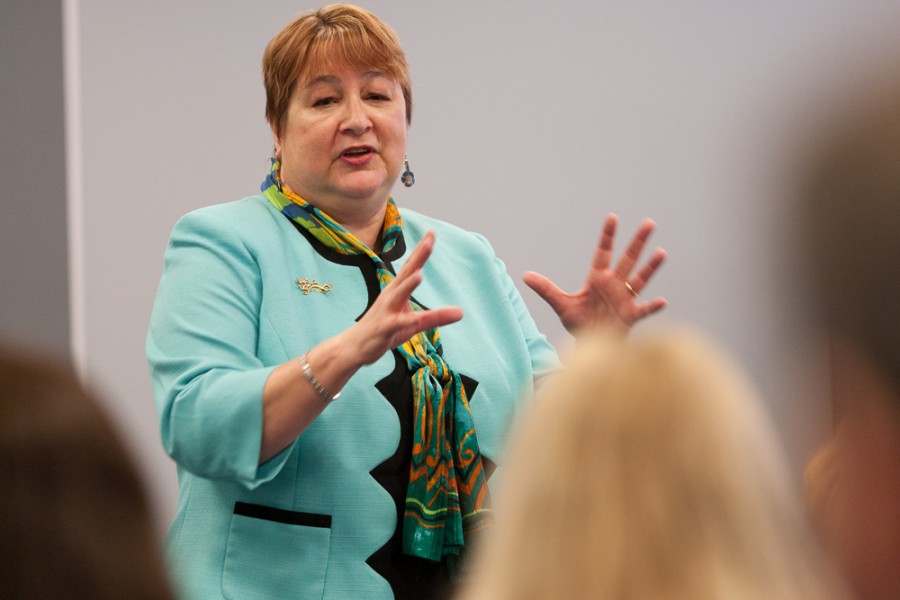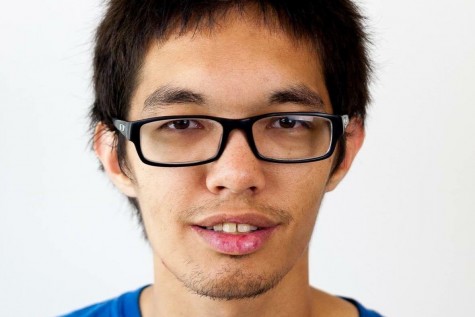Presidential candidate addresses campus issues, priorities
Margaret Madden answers questions posed by faculty members during one of the open forum sessions in the Arcola/Tuscola Room of the Martin Luther King Jr. University Union on Wednesday.
January 22, 2015
The open forums in the Arcola-Tuscola Room where filled with questions for the potential future president.
Margaret Madden is the provost and vice president for academic affairs at State University of New York at Potsdam (since 2002)
Madden obtained her bachelor’s degree in psychology at the University of Wisconsin.
She attended the University of Massachusetts were she got her master’s and doctorate degrees in psychology.
She has also been a psychology professor and an acting president at Potsdam.
“I have been lucky enough to been able to do some teaching,” Madden said. “I really value that because it gives me a chance to interact with students in the way faculty members do.”
Madden, originally from Glen Ellyn, spoke on her excitement to move back from New York where she has been for 16 years.
“My husband, who is a Wisconsin native, and I often talk about the fact that although we have been on the east coast in various places for quite a long time, our sensibilities are really Midwestern sensibilities,” Madden said. “Some of the stereotypes about New Yorkers are true.”
Madden explained during the forums that she would be a good fit for Eastern based on her experiences at Potsdam, which is a similar institution in terms of size, community atmosphere, and other factors.
Madden also talked about priorities and issues within the institution.
Jeanne Lord, the associate dean of the Lumpkin College of Business and Applied Sciences, asked Madden what her concerns were about being the president of a university in Illinois.
Madden said problems like funding are present in every state, and she would focus on convincing legislators that Eastern is economically vital through methods like asking students to share personal stories.
“College presidents these days have a much more external role than they used to,” she said. “As much as I love being on campus and participating in campus events, it’s certainly going to be incredibly important to make the argument that this college is one of the most valuable institutions in the state.”
When it comes to the budget, Madden said looking at the numbers is important, but the context and likely outcomes should be considered when making cuts.
Enrollment was also brought up.
She said it would be beneficial to “to look at pockets of recruitment where there has been a decline in interest.”
She said many of her ideas to improving the budget and enrollment would be implemented in a strategic plan she would hope to set up if she was chosen for the position.
Bill Robenson, a local retired businessman, said enrollment is important for money purposes.
“Enrollment is the bill,” he said. “We (have to have) students to pay tuition, and get government support.”
A main priority for her is funding the institution through the use of fundraising and other sources of revenue.
“One of the things I been very involved at my own campus in terms of fundraising, are identifying donors who are interested in supporting directly towards student activities of various kinds,” she said.
Madden said she would like to obtain funds that would support student research mentored by faculty members.
“I would expect that some of that revenue seeking activity would be (used to) allow students to do some of those things that make the experience more individualized and more meaningful,” she said.
Maggie Burkhead, the director of TRiO, asked Madden what it meant to her to have a commitment to diversity.
Madden said she has promoted equitable, justice-oriented attitudes on every campus she has worked on.
“I spent most of my career thinking about diversity issues,” Madden said. “As a psychology instructor I first started looking at gender issues in that curriculum, but quickly realized that if we were going to talk about inclusiveness, gender wasn’t enough.”
Catherine Polydore, a professor of counseling and student development, said she feels a sense of ethnic minority students and faculty not welcomed on campus or in the community.
Madden said her university created a community-wide group including people from the university, city officials and business owners which functioned not only to foster the feeling of being welcome, but also to directly address racist behaviors.
Mildred Pearson, an education professor, asked how Madden would address the recruitment and retention of minority faculty.
“We have a growth at Eastern of 30 to 40 percent minority increase, but students don’t see a reflection of themselves when they get to the classroom,” Pearson said.
Madden said her university was able to create target of opportunity appointments in which departments that could identify a qualified minority candidate could create additional lines to hire them.
Peggy Brown, an administrative assistant in the school of continuing education, asked about Madden’s experience with collective bargaining and unions.
Madden said as the provost of her university, she meets regularly with its unions, and though she has had grievances filed against her, she said working in consultation with the unions usually leads to more equitable outcomes.
After being questioned about the importance of technology on campus, Madden voiced her interest in keeping the school up-to-date.
“It is important to keep current, and that means it is a simple part of financial expenses. It is just a part of the landscape now,” she said.
During the community forum, Madden said the relationship between the campus and the community is beneficial to all.
“Think about how this place would be like without this campus,” she said.
Herbert Lasky, Eastern’s former dean of the honors college, said his most important concern is the candidates’ attitude towards students and their potential, and how much support they will have academically.
He said there have been tension between academic, athletic, and the business office.
“The joke is that the business office believes the university exists for its benefits, but their wrong, its athletics,” Lasky said.
He said the tension would be a problem the candidate will inherit if she becomes the next president.
Other community members also expressed their concerns about athletics exceeding in funding.
Madden said while she does not know all of the facts of the situation, but it could be resolved.
“I am certain there are ways to change the actions so that sort of thing does not happen again,” she said.
Andrew Doto, a college student affairs graduate student, asked Madden during the student forum what was the most important lesson she learned in her career.
“Trust my gut feeling about issues that have to do with integrity,” she said. “With controversial issues, I like to make sure everyone at the table has a chance to speak.”
Madden said she has a high believe in shared governance within the institution.
“For many of the kinds of decisions that might affect students, I think consultation with the government structures here is the way to go,” Madden said.
Grant Sterling, a philosophy professor, said while it was good to see the potential candidate, there are inevitable problems with the forums.
“It is awfully hard, in a session like this, with 45 minutes to speak, to try and get an idea,” Sterling said. “The problem is it is impossible for them to say anything concrete.”
He explained several topics brought up, like the budget and enrollment cannot be given accurate helpful answers, without the candidates being in the position.
Madden said if she became the next Eastern president, she would use the first few months to listen to the campus community before making decisions, since every institution has its own “culture.”
Jacob Deters, a college student affairs student said attending the forums is important to him as a previous Eastern undergraduate.
“I want to make sure EIU is in good hands, (and) I want to see (the direction) it is going to go,” Deters said.
Debby Hernandez can be reached at 581-2812 or dhernandez5@eiu.edu.





































































